




 |
   |
 |
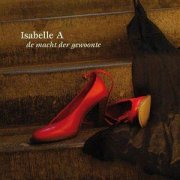 |
De Macht der Gewoonte (2008, 42.12) **½/T |
|
| Karavaan Diagonaal Hou Je Nog Van Mij Onder de Sprei Het Heeft Geen Nut De Macht der Gewoonte Straatlied Zonder het te Weten |
Laconiek Je Bent Niet Alleen Het is Voorbij Komen en Gaan |
|
Current availability:
Mellotron used:
Isabelle A(dam) is a Belgian Flemish-language pop artist, who released her first album aged fourteen, in 1989. 2008's De Macht der Gewoonte is something like her eighth release, ignoring compilations, an acceptable and reasonably diverse but unexciting set of mature pop songs that, due as much to the language barrier as anything, are unlikely to travel well outside the Benelux region. Best track? Probably slow, mournful, brass-led closer Komen En Gaan, a genuinely mature piece of work.
Alex Callier plays Mellotron, with uncredited flutes on Straatlied and upfront, credited string and flute parts, complete with key-click, on Je Bent Niet Alleen, but it really isn't anything you haven't heard before. I've heard far, far worse albums than De Macht der Gewoonte, but far better ones, too. Good at what it does, I suppose.
 |
A Camp (2001, 55.31) ***/T½ |
|
| Frequent Flyer I Can Buy You Angel of Sadness Such a Bad Comedown Song for the Leftovers Walking the Cow Hard as a Stone Algebra |
Silent Night The Same Old Song The Oddness of the Lord Rock'n'Roll Ghost The Bluest Eyes in Texas Elephant |
|
Current availability:
Mellotron/Chamberlin used:
A Camp (as in B Camp, C Camp etc.) are a Cardigans offshoot, or a Nina Persson solo project, depending on whom you believe. Much of the album was recorded in the late '90s with collaborator Niclas Frisk, then picked up again in 2001 after some Cardigans activity before being handed to Sparklehorse's Mark Linkous, with the end result that it sounds rather like... Sparklehorse. This isn't actually a bad thing; in fact, it's probably better than sounding like the Cardigans, but it isn't actually as good as Sparklehorse themselves, although Persson's voice (dry and high in the mix) carries the lesser material. Most of A Camp is as melancholy as you'd expect, to greater or lesser effect, although a few tracks break the mould, notably the rocking Hard As A Stone.
No fewer than five people are credited with various tape-replay instruments, with Persson, Frisk, her partner Nathan Larson and Clayton Doley on Mellotron and Linkous on Chamberlin. It's incredibly difficult to tell what's what in the mix, to be honest, with Linkous playing God only knows what on Chamberlin on I Can Buy You and faint Mellotron flute from Doley on Such A Bad Comedown. Larson and Frisk both play Mellotron on Song For The Leftovers, with a strings part played alongside real cello and a few seconds of shaky flute from the other player, leaving a triple-whammy on Algebra from Doley, Persson and Linkous, with a 'Strawberry Fields'-style polyphonic flute part and strings, once again alongside real ones. Several tracks also feature Orchestron and/or Optigan, just to heavily confuse the issue, as if it needed confusing at this stage. However, it seems likely that the Chamberlin's sampled, although the Mellotron is supposedly a (then-) new MkVI.
See: Cardigans | Nina Persson | Sparklehorse
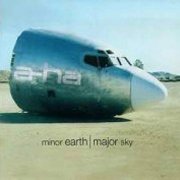 |
Minor Earth, Major Sky (2000, 58.38) ***/TT |
|
| Minor Earth Major Sky Little Black Heart Velvet Summer Moved on The Sun Never Shone That Day To Let You Win The Company Man Thought That it Was You |
I Wish I Cared Barely Hanging on You'll Never Get Over Me I Won't Forget Her Mary Ellen Makes the Moment Count |
|
 |
Analogue (2006, 54.29) **½/T½ |
|
| Celice Don't Do Me Any Favours Cosy Prisons Analogue (All I Want) Birthright Holyground Over the Treetops Halfway Through the Tour |
The Fine Blue Line Keeper of the Flame Make it Soon White Dwarf The Summers of Our Youth |
|
Current availability:
Mellotrons used:
It may come as a surprise to you to learn that A-Ha are still going; best known for a handful of mid-'80s hits, including the immortal Take On Me and vocalist Morten Harket's unearthly several-octave voice. Minor Earth, Major Sky (OK, that's actually Minor Earth | Major Sky, isn't it?) is actually only their sixth album in fifteen years, after a seven-year break, pretty much what you'd expect of an A-Ha album at the turn of the millennium; glossy, reasonably intelligent pop with enough contemporary touches to make them at least slightly relevant. Assuming it's real, I believe guitarist/songwriter Paul (originally Pål) Waaktaar-Savoy plays the (new MkVI) Mellotron, with strings across the board. It's so far in the background on the title track that I'm not entirely sure it's there, while the strings on Little Black Heart sound real, but there's much more upfront use later in the album, the Mellotron highlight here being closer Mary Ellen Makes The Moment Count, with a MONSTROUS Mellotron string chordal part. Assuming it's real...
Six years on and A-Ha dug the ol' Mellotron out again for the aptly-named Analogue. Or did they? Musically, it's... well, an A-Ha album, so it's pretty mainstream modern pop, albeit very musicianly pop, but there's nothing here that's likely to excite the more, er, 'sophisticated' listener very much. Lots of stuff that could be Mellotron, only three tracks I'd put any money on, with flutes and possibly strings on opener Celice, definite choirs on Don't Do Me Any Favours and flutes and background choirs on Halfway Through The Tour.
See: Magne Furuholmen | Morten Harket | Savoy
 |
Technicolor Dreams (2007, 45.51) **½/T½ |
|
| Invisible Cornice Dance Mrs. Macabrette Letter to Myself Ease Off the Bit Powder on the Words Amnesy International Santa Barbara |
Bug Embrace Danish Cookie Blue Box Technicolor Dream B4 I Walk Away Panic Attack #3 |
|
Current availability:
Mellotron used:
...A Toys Orchestra's fifth album, 2007's Technicolor Dreams, is a surprisingly appealing piece of contemporary pop/rock that somehow manages to avoid doing all the irritating things that a band from the English-speaking world would do. Better tracks include the synth-heavy Cornice Dance and the creepy Bug Embrace, although little here actively offends.
Fausto Ferrara plays Mellotron, with faint flutes on Cornice Dance, more obvious ones on Mrs. Macabrette, a major string part on Ease Off The Bit, background choirs on Santa Barbara and flutes on the title track. Real? Sounds it, but who knows? OK, not the most exciting album you're going to hear all year, but rather better than expected, possibly proving that continental European indie might be a rather more listenable proposition than that from Britain or the U.S.
 |
Return to N.Y. (2004, 35.02) ****/TTTT |
|
| Greasy Spoon Return to N.Y. Women to Control Your Mother's Faith Hollywood Time for the Muse Only the Stars Cold War of the Hearts |
World Traveller Human Clones Boys & Girls |
|
Current availability:
Mellotron/Chamberlin used:
When the mighty Änglagård played Germany in 2003, drummer Mattias Olsson sloped off at one point to pick up an Optigan he'd purchased. An Optigan, you ask? A toy instrument, effectively, made by the Mattel Corporation in the '70s, also used (briefly) by Steve Hackett. It operates by shining a light (the 'opti' part) through clear film discs imprinted with waveforms, containing infinitely-sustaining sounds and rhythms. Sound like something else you've heard of? Apart from the infinite sustain... It works on the same basis as the more professional Orchestron, as used by Kraftwerk, Rainbow etc. (which, funnily enough, is also in Mr. Olsson's keyboard arsenal), although it's far more low-fi. Yes, more low-fi. While its lack of sound quality almost certainly hampered its sales at the time, it's now part of its appeal, especially if you like weird, fucked-up sounds. Enter Mattias.
Mere months after his purchase, Mattias ran into AK von Malmborg and a jam turned into a recording session which quickly turned into an album under the name AK-Momo, based largely on the Optigan's loungecore rhythms. In fact, the Orchestron and Mellotron are the only other instruments on Return to N.Y., giving the whole thing a scratchy, almost grimy feel. I expect the record has its antecedents, but I'll be fucked if I know what; imagine Tom Waits... No, don't. Um, I give up. Various other Olsson projects from the last few years? Anyway, the material is catchy in a weird kind of way, with some gorgeous melodies from the mouth of the lovely AK, although she sings endearingly flat in places; hey, who needs perfection anyway?
Mattias' Mellotron crops up on all but one track, as you can see. It certainly isn't always at the front of the mix, although Greasy Spoon and Only The Stars feature solo spots at their relative conclusions. Sounds? All the usual suspects (is that the string section on Greasy Spoon?), while there are probably several things I haven't yet identified; I'm sure I have an e-mail somewhere detailing such things, although it could've been lost in The Great E-Mail Crash Of Late 2003. Oh hang on... found it (so why not just delete that last sentence? Eh?). He uses (deep breath):
 |
And for those who are interested, the Orchestron sounds are:
I'm sure I should giving this more than four Ts, but much of the Mellotron use isn't readily apparent as such, although that should really be in the album's favour, surely? Anyway, this is sort-of pop, but sort-of something else entirely. I've no idea who it might appeal to, but I urge you to at least listen to the clips on the Exergy site if nothing else and make your own minds up. I like it, anyway.
See: Änglagård | Molesome | Nanook of the North
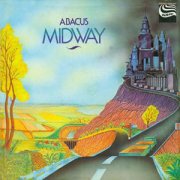 |
Midway (1973, 38.56) **½/T½ |
|
| Let's Face the Voices and Dance Including Revelation Me and You 11 Farden (You're Not) the One I Love For the Moment (Unaware) Be Beholding Herman the German |
Here We Go Midway |
|
Current availability:
Mellotron used:
Like many German bands in the '70s, Abacus employed a British vocalist to (hopefully, usually fruitlessly) make themselves more appealing to the English-speaking market, in this case, one Chris Williams. 1973's Midway appears to be their fourth album, a pretty nondescript effort, if truth be told, mostly mainstream rock of the kind largely (and largely deservedly) swept away by the tides of history. Stylistically, it shifts between acoustic strumalong opener Let's Face The Voices And Dance through the brief, rhythmic Including Revelation, countryish ballad Me And You, the jokey 11 Farden and the rocky Be Beholding (let's draw a discreet veil over Herman The German), displaying either a) dazzling diversity, or b) a serious lack of focus. I suggest b). If the album has a best track, it's passably proggy ten-minute closer Midway itself, although it's never going to win any prizes in any 'proggest track of all time' competition.
Chris Barutzky plays Mellotron, with a rising string line towards the end of Including Revelation, a chordal string part on For The Moment (Unaware) and strings dipping in and out of the closing title track, for what it's worth. Is this worth the effort? Not really, no, although those of you who just can't get enough early '70s mainstream German rock might wish to investigate.
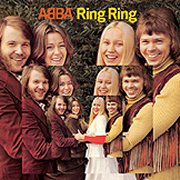 |
Ring Ring (1973, 35.50) ***/T |
|
| Ring Ring (Bara du Slog en Signal) Another Town, Another Train Disillusion People Need Love I Saw it in the Mirror Nina, Pretty Ballerina Love Isn't Easy (But it Sure is Hard Enough) Me and Bobby and Bobby's Brother |
He is Your Brother Ring Ring I am Just a Girl Rock'n'Roll Band |
|
 |
Waterloo (1974, 38.42) ***/TT½ |
|
| Waterloo (Swedish version) Sitting in the Palmtree King Kong Song Hasta Mañana My Mama Said Dance (While the Music Still Goes on) Honey, Honey Watch Out |
What About Livingstone Gonna Sing You My Lovesong Suzy-Hang-Around Waterloo |
|
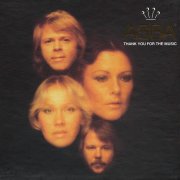 |
Thank You for the Music [Disc 4] (1994, recorded 1970-82, 74.23) ***/½ |
|
| Put on Your White Sombrero Dream World Thank You for the Music (early version) Hej Gamle Man! Merry-Go-Round Santa Rosa She's My Kind of Girl Medley |
You Owe Me One Slipping Through My Fingers/Me and I (live) ABBA Undeleted Waterloo (French/Swedish version) Ring Ring (Swedish/Spanish/German version) Honey, Honey (Swedish version |
|
Current availability:
Mellotrons used:
It's weird, thirty years on, to think that Abba (or ABBA) were only one of several projects with which the various members were involved at the time, with no foreknowledge of which, if any, would take off. Their first album, Ring Ring, took a year to record, finally appearing in '73 and was an instant hit in their native Sweden, although the rest of the world took another year to catch the bug. The tracklisting above is the original Swedish one, plus the CD issue's bonus tracks; the international version shifts everything around, losing the Swedish-language title track and adding a b-side, She's My Kind Of Girl. It has to be said that, excellent title track aside, Ring Ring shows little of the worldbeating talent that was soon to emerge; most of the songs are schmaltzy, lightweight pop, with none of the melodic and harmonic twists that made the best of their later material so compelling.
Benny Andersson is credited with 'piano and Mellotron', which can be read as 'largely piano'; in fact, the classic title track (both Swedish and English versions) and Another Town, Another Train are the only apparent examples. The occasional strings on the album appear to be real, but we get very background strings on the former (thanks, Mike) and an upfront polyphonic flute melody on the latter. It's interesting to note that not every track has an Agnetha/Frida vocal; several tracks have either Benny or Björn singing (sorry, don't know which), as they obviously hadn't yet worked out the band's other chief selling point, besides their songwriting.
Abba's international breakthrough came, of course, with their 1974 Eurovision winner, the fabulous Waterloo. You may scoff; listen to it again and hear how the vocal and piano melodies twist round each other in the bridge and the inspired way the descending figure is halved before the last chorus. Much of the rest of Waterloo (original Swedish tracklisting here, again) is nearly as unconvincing as the bulk of their debut (King Kong Song, anyone?), although there are a few better tracks. On the Mellotron front, Andersson sticks string arrangements onto three tracks, the mock-calypso Sitting In The Palmtree being the best Mellotron part and Gonna Sing You My Lovesong the best actual song.
Over a decade after their dissolution, 1994 brought the four-disc Thank You for the Music, a typical box set of the era, freely mixing hits, album tracks, b-sides and outtakes, making the usual expensive package that fully appeals to neither casual nor committed fans. Ouch. Anyway, all we're interested in here is disc four's twenty-three minute medley ABBA Undeleted, a string of edited outtakes strung together with studio chat and the like. Interesting for the hardcore fan, it actually contains the occasional gem, although it's difficult to work out what's what. Mellotron? Amusingly, this was pointed out to me years ago by ex-Änglagård maestro Mattias Olsson, fittingly enough, with quite literally a second or two of strings during some studio noise around the 6:40 mark. That's it.
So; two formative albums from one of the '70s major pop outfits, with all the best tracks available on compilations. The Mellotron use is nothing special, although Another Town, Another Train is quite nice, with the Waterloo tracks being OK, but inessential. I've had people tell me they can hear the Mellotron on later Abba efforts, particularly tracks from their third album, ABBA, but after listening closely, the jury's still out. Incidentally, I know Elvis Costello's Oliver's Army nicks the piano riff from Dancing Queen, but I'd put money on the chorus coming directly from Dance (While The Music Still Goes On), too.
See: Frida | Hootenanny Singers
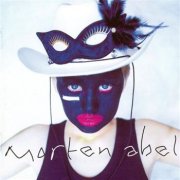 |
Snowboy (1997, 45.16) **½/T½ |
|
| Not Emotional Helicopter Later Maybe Lydia So Be it All Or Nothing Get Up (Time is a Thief) Our Day's Coming |
Visions of Love Sailor Leave Her for You A Day Without Light Snowboy |
|
Current availability:
Mellotron/Chamberlin used:
Morten Abel (Knutsen) found fame with Mods and The September When, releasing his solo debut, Snowboy, in 1997. It's a pretty mainstream pop/rock affair, to be honest, Abel's rather irritating voice not helping matters overly, along with material like infuriating opener Not Emotional, Get Up (Time Is A Thief) and the trance-lite A Day Without Light. In fairness, it's not all bad, the more acoustic tracks (notably Later Maybe and So Be It) alleviating matters, while the best thing here is the closing title track, a short, instrumental, acoustic guitar piece that stands head and shoulders above the rest of the record.
Producer Glenn Rosenstein plays Mellotron and Chamberlin, with the occasional flute note and a brass part on Helicopter, an upfront flute part opening All Or Nothing, with strings later on, strings on Get Up (Time Is A Thief) and a flute line on A Day Without Light. I really can't recommend this on musical grounds, although it's nice to hear both tape-replay 'boards on one album, even when they're rarely upfront.
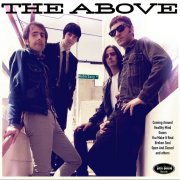 |
Waterbury Street (2014, 31.43) ***/T |
|
| Coming Around Do You Have a Healthy Mind? The Prisoner Goons Dog Without a Bone We Could Be Together You Make it Real Do What You Wanna Do |
Broken Soul I Never Had Much to Say Ordinary Life Open and Closed |
|
Current availability:
Mellotron used:
The sleeve of Brooklynites The Above's second album, 2014's Waterbury Street, tells you precisely what you're going to get: Beatles, Byrds, Yardbirds, Searchers... Is this a bad thing? Not in this case, no; their attention to detail is superb, several songs having a strong Ticket To Ride/Needles And Pins Rickenbacker jangle vibe about them. Highlights? Opener Coming Around, if for no other reason than it sets their stall out so well, Goons and Broken Soul, maybe, but there's nothing here to disappoint the 'British Invasion' fan (in inverted commas as it's a phrase that means little outside the band's native country). If I have a criticism, it's that some of the material comes across as pastiche, rather than homage, but there are worse crimes.
Vocalist/guitarist David Alan Horowitz plays what sounds like real Mellotron on two tracks, with choppy strings on I Never Had Much To Say and Open And Closed, to reasonably good effect. So; original? Don't be silly. Does it matter? Not really, no; The Above are hardly the most unoriginal band around and at least they've picked a relatively unusual style to copy.
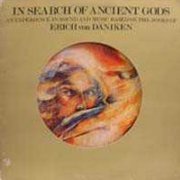 |
In Search of Ancient Gods (1976, 51.04) ****/TT |
|
| Earthbound Part 2: Future Past Moon City Miracles of the Gods Part 2: El Enladrillado Part 3: The Legend of Santa Cruz Part 4: Pyramids of Teotihuacan Part 5: Temple of the Inscriptions |
The Gold of the Gods Toktela Chariots of the Gods Return to the Stars |
|
Current availability:
Mellotron used:
I'm told (thanks, Clive) that In Search of Ancient Gods, die-cut sleeve and all, was, essentially, a vanity project from the then-sixteen year old (!) Paul Fishman, bankrolled by his wealthy businessman father, or so the music press said at the time. The album is subtitled An Experience in Sound and Music Based on the Books of Erich von Däniken and contains a booklet outlining von Däniken's now somewhat discredited theories (the sort of stuff I believed implicitly when I was twelve and had grown out of by, ooh, thirteen). The album's entirely instrumental, with one lengthy piece taking up the bulk of side one; basically 'melodic symphonic/electronic', for want of a better phrase, although Fishman mix'n'matches styles pretty well, closer Return To The Stars even having something of a funk vibe about it.
There's only a little Mellotron to be heard and I'm not even entirely sure I've got the right parts of Miracles Of The Gods (note, by the way, the odd habit of titling a track, then titling its successor 'part 2', 'part 3' etc.), but I think the first Mellotron you hear (strings and flutes) is on Miracles Of The Gods itself. The main use, though, is on Part 5: Temple Of The Inscriptions, featuring some nice flute and strings work from Fishman himself, with a lengthy buildup to a superb crescendo at the end of the track.
Amusing aside: Bill Bruford plays on the album, apparently hired by Fishman's father to give the album some measure of credibility, but was slated for his involvement. Fishman was reported at the time as starting work on a follow-up, but it never happened. Anyway; a good album, without being great. Mostly very mellow, but a few powerful moments thrown in to keep you on your toes and some nice, if sparingly used Mellotron. Buy if you don't have to pay too much.
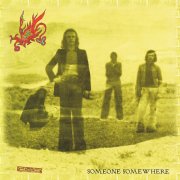 |
Someone Somewhere (2009, recorded 1973-77, 57.32) ****/TTTSomeone SomewhereObjet de Cire Meg Merrilies Touch the Sun Suspension Univers Insensé Oiseau de Feu The Old World Death Riding Earth |
Current availability:
Mellotron used:
Who'd have thought, well over twenty years after top French progressive label Muséa coalesced from the ether, that release-quality tapes of effectively unknown bands would still be turning up? Worthwhile bands, at that? Grenoble's Acanthe toured around France between 1973-77 and, clearly, recorded much of their repertoire, but released nothing, until band leader Frédéric Leoz unearthed a cache of tapes, presumably during the 2000s, the end result of his reconstruction efforts appearing in 2009 as Someone Somewhere. And... it's a winner! Almost an hour of previously-unknown French prog from the genre's glory years, featuring Leoz' variously English- and French-language vocals, at its best on the excellent Meg Merrilies, Touch The Sun and Oiseau De Feu, although Suspension's mainstream rock sounds like an attempt to write a single; either that, or it was recorded late in their career, as progressive rock 'straightened out'. Or, of course, both.
Leoz played keys (and guitar, for what it's worth; how did they do this live?), including Mellotron, although whether or not they actually owned one is unknown. It's on almost every track, with distant choirs and upfront strings on the opening title track, strings on Objet De Cire and choirs on Meg Merrilies, while Touch The Sun opens with a slightly distorted flute part straight out of a Fourteenth-Century French courtroom, with chordal strings under the guitar solo and flutes again at the end. Strings on the last four tracks, particularly upfront on Oiseau De Feu, finish things off nicely, although, before you get too excited, much of it's fairly low in the mix and mixed with string synth. Well, without rivalling the French giants (Ange, of course, Mona Lisa and Shylock, to name but three), this is a superb find, definitely worth the price of entry. Once again, thank you, Muséa.
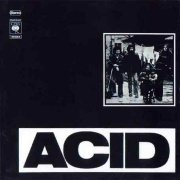 |
Acid (1974, 37.27) **½/TTAfter MidnightMidnight Queen Tumbling Like a Rolling Stone Your Sweet Love Six to Seven Hard Rockin' Band Hey Freddy On a Sunny Day Blind Man |
Current availability:
Mellotron used:
Austria's Acid sound like they should be a dark, heavy, late-period Euro-psych band (I seem to remember there was an '80s Belgian thrash outfit of the same name); sadly, going by their (sole?) eponymous release, they were a dull, mainstream rock band with occasional pretensions towards heaviness, notably Tumbling Like A Rolling Stone and the presumably not ironically-titled Hard Rockin' Band. The rest of the album veers between the brass-rock of opener After Midnight, the crummy pop/rock of Your Sweet Love and On A Sunny Day and several rock'n'roll-lite efforts, the nearest it gets to 'good' being seven-minute prog-lite closer Blind Man.
A gentleman sporting the internationally-unfortunate name of Robert Ponger plays Mellotron, with a heavily-effected background string part on Tumbling Like A Rolling Stone, a more regular (if still background) one on Hard Rockin' Band and strings, flutes and a nicely upfront cello solo on Blind Man. Acid isn't the greatest obscure European album you'll ever hear, although its final track might just be worth the effort for fans of the era, as much for its Mellotron content as for the actual music.
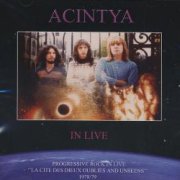 |
In Live (2012, recorded 1979, 53.13) ***/TT½AdyaneChasse à la Licorne Voyage Labyrinthe La Cité des Dieux Oubliés |
Current availability:
Mellotron used:
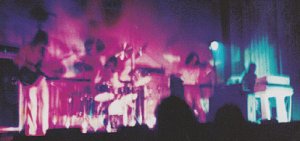 |
Acintya were a rather German-sounding one-off French progressive outfit from the late '70s. German-sounding? In that their music was almost entirely un-progressive in intent, being largely mid-paced instrumental workouts slathered in string synth in a rather uninteresting kind of way. See: Ivory, Flaming Bess, Faithful Breath etc. etc. Harsh? But fair. Sorry, Germany. The strangely-titled In Live was recorded (badly) at a gig in Nancy in January '79, in front of an extremely enthusiastic audience; either that, or the crowd noise was added later, which is possible, I suppose. At one point, it sounds like they're about to riot, which seems rather unlikely, Italian Van der Graaf fans notwithstanding. This is, after all, not Italy. Nor Van der Graaf.
Anyway, we get five fairly long tracks, three from their lone album and two new ones, all pretty similar in their rather drifting approach to the genre, Labyrinthe and closer La Cité Des Dieux Oubliés being about the only ones with any life to them at all and then only sporadically. Don't get me wrong, this isn't awful, but I'd be lying if I said I hadn't heard a great deal better. This is what happens when a band forms some years into the existence of a genre and have clearly only really listened to their forbears, rather than to their forbears' influences. See: most British so-called neo-prog of the early '80s. Yes, Marillion, I mean you.
Mellotron? Acintya didn't use one in the studio, while the lone live pic of the band in the booklet (right) is inconclusive, but yes, there it is. Keys man Philippe de Canck mostly used it for melodic string lines, as against chordal parts, while final proof comes in the obviously Mellotronic flutes in Voyage and cellos in Labyrinthe. I've no idea if they owned one by this point, or borrowed/hired one in for the gig, nor do I know how I'd find out. I'm afraid to say that this is a rather dull effort, overall; not awful, just not much of anything at all. I always applaud Muséa's completist approach - after all, no-one's making anyone buy anything - but this rather murky, uninteresting album really is for die-hards only. Three stars for at least trying to be progressive.
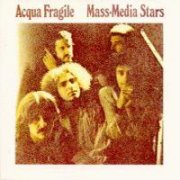 |
Mass-Media Stars (1974, 37.54) ****/TTTCosmic Mind AffairBar Gazing Mass-Media Stars Opening Act Professor Coffee Song |
Current availability:
Mellotron used:
Acqua Fragile's second release, Mass-Media Stars, is an excellent Italian progressive album, if not quite reaching the heights of PFM (who vocalist Bernardo Lanzetti subsequently joined), Banco or the best New Trolls work, among others. Where it does win out is in the quality of the songwriting; much of the material is highly memorable, with melody to the fore. Highlights include the title track and Opening Act, but there isn't really a bad track on the album.
Maurizio Mori's Mellotron work is fairly extensive, though strangely unexciting; he uses the strings as a useful backdrop sound, without ever doing anything particularly vibrant with them, although Cosmic Mind Affair, for one, is smothered in the thing. The end result is a good album, with a fair bit of Mellotron use, which I find it difficult to recommend as a Mellotron Album. It is, however, a good album in its own right, so I'll recommend on those grounds. By the way, their self-titled debut (***) is a really quite ordinary folk-influenced album, so don't go buying it expecting more of the same.
See: PFM
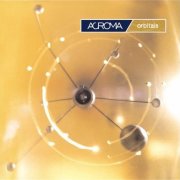 |
Orbitals (2003, 56.37) **½/½ |
|
| Careless Ones (Intro) Sun Rises Down Sweat Wash Away (Some Desert Night) Don't Think Just Move Motive Perfect Big Karma Now |
Distance Orbitals On That Day Slow Down Take the Pain |
|
Current availability:
Mellotron used:
Acroma were one of those mid-American bands who take a bit from here and a bit from there to synthesize their unbelievably homogeneous sound, in this case, a lot like Tool side-project A Perfect Circle. For those none the wiser, this means gutless heavy rock with unmemorable riffs and a largish dose of U2, particularly in the vocal department. Sound like your bag? Thought not. Orbitals is their only album and has few genuinely positive qualities. I mean, it does what it does perfectly well, but why do it at all? There's no obvious passion in this album; it sounds like it was recorded to try to sell as many copies as possible, in which it failed dismally, proving that there's no point in trying to sound commercial; you either are or you aren't. Mind you, tell that to Def Leppard or the hideous Bon Jovi.
Producer Sylvia Massy, under the name Sylvia Massy Shivy, adds 'Mellotron strings' in places, with an occasional part on Don't Think Just Move; although it could be hidden away in one or two other places, that's probably your lot. So; I really wouldn't bother, for either music or Mellotron. No, really.
 |
Don't Cut Your Fabric to This Year's Fashion (2004, 50.19) **/T |
|
| This Year's Fashion Drug Like Photograph Basic Tiny Fragments Bleed Instructions on Building a Model Airplane A Simple Question Eighth Grade Summer Romance |
Lets Never Go to Sleep Broken Four-piece Jigsaw Puzzle Don't Cut Your Fabric The Short Weekend Begins With Longing |
|
Current availability:
Mellotron used:
Action Action are almost as wanky as their name suggests; a hint of mod, more than a hint of early-'80s new wave/synthpop, a huge fucking hint of current indie. Is this stuff currently popular? Rest assured, it won't be for long. The trouble with being fashionable is how quickly you become unfashionable, isn't it? Some of the irritatingly- (and ironically-) titled Don't Cut Your Fabric to This Year's Fashion rocks more than other parts, but the only thing that really caught my attention was some of the synth sounds, not least the great portamento part that opens the album. Songs are shit, though.
Mellotron on three tracks, from band-leader Mark Thomas Kluepfel, with muted strings on Bleed, a few seconds of uncredited strings on Instructions On Building A Model Airplane and a more noticeable flute part on Eighth Grade Summer Romance, but it's hardly enough to be worth bothering with. A waste of time. Incidentally, Kluepfel's second album under this name, 2006's An Army of Shapes Between Wars, definitely uses Mellotron samples, but it's so buried in the mix here that it's impossible to tell whether the same applies.
See: Samples etc.
 |
Gravelled & Green (2001, 49.26) **½/T |
|
| Yardwork in November Standing By Time and Space Bad Day Halfway House Interlude Bourgeois Blues Testimony |
End of May On a Roll Shades of Brown The One That Got Away |
|
Current availability:
Mellotron used:
The Actual Tigers (originally Willis) released their lone album under their new name, 2001's Gravelled & Green, towards the end of their time together, an indie/folk/Americana thing, for want of a better description. Someone on Discogs think they sound like early Wilco; perhaps they're right. It's a pretty bland effort, frankly, probably at its least dull on the vocal and trombone work on the otherwise undistinguished Time And Space, the brief, delay-heavy Interlude and the gentle End Of May. Compounding the problem is its length: nearly fifty minutes is too long for this kind of stuff, although, to be fair, I'm sure they had a several-years song backlog waiting for that elusive contract. Incidentally, a couple of songs date from Willis days, Halfway House and End Of May also found on their eponymous 1996 release.
John Low plays (presumably) Ardent Studios' M400 on three tracks, with a gnarly string line on Testimony and full-on polyphonic flutes on On A Roll, although whatever he played on closer The One That Got Away is effectively inaudible. Despite a 2007 reissue on Slow Love, this is most likely out of print by now. Oh well.
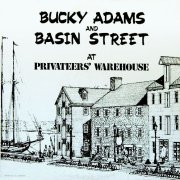 |
Bucky Adams & Basin Street at Privateers' Warehouse (1976, 41.57) ***/TTTT |
|
| Basin Street Blues Bucky's Blues Feelings Middle Deck Misty Ain't No Sunshine I'd Like to Make it With You Afro Minor |
I Can't Get Started Don't Get Around Much Any More Basin Street |
|
Current availability:
Mellotron used:
Bucky Adams (1937-2012) was a tenor saxophonist from Nova Scotia, who played with many of the jazz greats, not least Louis Armstrong, also leading several bands from the era's Halifax scene. His only release with his band, 1976's mostly instrumental Bucky Adams & Basin Street at Privateers' Warehouse, is a studio collection (although its title suggests otherwise) of (mostly) standards, with a handful of band originals thrown in. In all honesty, this is a bit bland, even for the mid-'70s, but this kind of jazz ensemble has rarely been about innovation, at least since the genre's early days. Better tracks include the propulsive, self-written Bucky's Blues (what it says on the tin), Ain't No Sunshine, with its squashy monosynth line and Afro Minor, but the bulk of this album consists of the kind of easy-listening jazz standards that we've all heard a few too many times already.
However, the album stands out in one respect (you've guessed it): alongside Rhodes and a Yamaha (mono)synth, Gordon Fader plays Mellotron, with cellos, flutes and strings on Feelings, a flute solo on Middle Deck, orchestralish strings on Misty, Ain't No Sunshine, I'd Like To Make It With You, I Can't Get Started and Don't Get Around Much Any More and a polyphonic flute part on Afro Minor, making this a startlingly Mellotron-heavy release for the genre. I've heard very few examples of music this generic with so much Mellotron, making this something of a one-off on this site. Worth hearing simply for its tape-replay work.
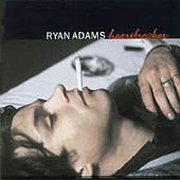 |
Heartbreaker (2000, 51.57) ***½/T½ |
|
| (Argument With David Rawlings Concerning Morrissey) To Be Young (is to Be Sad, is to Be High) My Winding Wheel AMY Oh My Sweet Carolina Bartering Lines Call Me on Your Way Back Home Damn, Sam (I Love a Woman That Rains) |
Come Pick Me Up To Be the One Why Do They Leave? Shakedown on 9th Street Don't Ask for the Water In My Time of Need Sweet Lil Gal (23rd/1st) |
|
 |
Gold (2001, 71.25/91.18) ***/T½ |
|
| New York, New York Firecracker Answering Bell La Cienega Just Smiled The Rescue Blues Somehow, Someday When the Stars Go Blue Nobody Girl |
Sylvia Plath Enemy Fire Gonna Make You Love Me Wild Flowers Harder Now That it's Over Touch, Feel and Lose Tina Toledo's Street Walkin' Blues Goodnight, Hollywood Blvd |
|
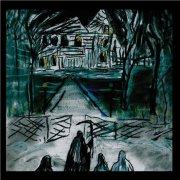 |
29 (2005, 48.54) ***½/T29Strawberry Wine Nightbirds Blue Sky Blues Carolina Rain Starlite Diner The Sadness Elizabeth, You Were Born to Play That Part Voices |
Current availability:
Chamberlins used:
After leaving the seminal Whiskeytown, Ryan Adams (amusingly sometimes confused with Bryan) launched his solo career in 2000 with Heartbreaker. Call it what you will; alt.country, country-rock, Americana, it's all country- and folk-influenced rock to a greater or lesser degree, for better or worse. Actually, it's not a bad album at all, with considerable input from Nashville non-mainstream regulars Gillian Welch and David Rawlings, although Adams seems a little over-keen on trading on his image as pin-up boy of the 'movement', such as it is. The material is a bit variable, to be honest, although different online reviewers find it impossible to agree, with a song like AMY being both loved and hated. For myself, the Emmylou Harris collaboration Oh My Sweet Carolina is a highlight, as is My Winding Wheel, although some of the tracks are just a little too...ordinary to cut it. Anyway, Chamberlin from Ethan Johns and Pat Sansone, with flutes and strings on AMY and strings on Oh My Sweet Carolina and (presumably) Call Me On Your Way Back Home, with a part that could be mistaken for real strings, although I don't believe there are any on the album. Bottom marks, incidentally, for the cover: anyone who tries to make smoking look 'cool' is a dickhead, in my opinion - it isn't and I'm sick of other people inflicting their addiction on me. Rant over. For now.
Adams followed up a year later with Gold, which appears to have come out in several different editions with various bonus tracks. The most immediately noticeable thing about the album is how much more mainstream it is, with far more band instrumentation on most tracks, although there are still plenty of folk/country touches, not least the banjo on Answering Bell. Compared to its predecessor, the album is way too long, too; this style of music really doesn't lend itself to an hour-plus of listening. Once upon a time, this would've been a double album; most bands only released one per career, if that. What happened to self-censorship or editing? I suspect being on Mercury has a lot to do with it. Anyway, best track? Possibly the near-ten minutes of Nobody Girl, with touches of Neil Young, particularly on the guitar front, or maybe the rockier Enemy Fire.
Just Ethan Johns on Chamby this time round, with strings on all highlighted tracks. Real strings on Goodnight, Hollywood Blvd and Sylvia Plath, by the way; nice to see someone writing about something worthwhile, for once... Incidentally, the extra tracks on the 'Side 4' EP included with some versions hark back to Heartbreaker in many ways, being more 'downhome' and folkier, particularly the excellent The Fools We Are As Men, though no Chamby input this time round.
Several years on and Adams used Ethan Johns again on 2005's 29, making for another Chamby album. The record itself is surprisingly downbeat, most tracks consisting of vocal and acoustic only, with sparse extra instrumentation where appropriate. Johns plays Chamby on two tracks, with strings on Nightbirds and muted brass on The Sadness, by the sound of it, although it's not what you'd call the most major use ever.
See: Whiskeytown